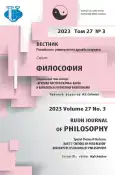Felix Noeggerath on Kant: Transcendental Synthesis as a Principle of System Formation
- Authors: Wiedebach H.
- Issue: Vol 27, No 3 (2023): KANT’S “CRITIQUE OF PURE REASON” AND WAYS OF ITS READING BY PHILOSOPHERS
- Pages: 598-613
- Section: KANT’S “CRITIQUE OF PURE REASON” AND WAYS OF ITS READING BY PHILOSOPHERS
- URL: https://journal-vniispk.ru/2313-2302/article/view/325239
- DOI: https://doi.org/10.22363/2313-2302-2023-27-3-598-613
- EDN: https://elibrary.ru/GUQRHL
- ID: 325239
Cite item
Full Text
Abstract
Walter Benjamin called Felix Noeggerath (1885-1960) the “universal genius” or simply “genius.” In his 1916 treatise “Synthesis and the Concept of System in Philosophy,” Noeggerath offered a reading of Kant’s concept of synthesis in an original and radical manner. He dares to confront thought with the incommensurability of atheoretical Being. The linkage between logic and incommensurability is what he calls rationalism. In contradiction to this claim, any attempt to exclude atheoretical Being from the realm of logic is anti-rationalism. Noeggerath elaborates on this in a penetrating discussion and modification of epistemological positions, especially those of the Marburg School and Hermann Cohen. Noeggerath constructs a notion of the philosophical system with the help of Kant’s three tables of transcendental judgements, categories, and principles in the Critique of Pure Reason. Each of these tables is known to contain 12 individual elements in four groups of three each. For the systematic division, the third group under the title “Relation” is decisive. Noeggerath assigns one systemic part to each kind of relation: “For it is to be connected: the categorical relation with ethics, the hypothetical with logic, and the disjunctive with aesthetics.” As a result the classical sequence, beginning with logic, is changed. “The order of the limbs is: a) ethics, b) logic, c) aesthetics.” In Noeggerath’s logical outline, specific mathematical concepts of meta-geometry play a decisive role. According to him, philosophy can resemble their preciseness in building a viable concept of the infinite. The prerequisite is that philosophy does not itself behave mathematically but proceeds along its own path in critical distance to the “specialized, act-kindred thinking” of the mathematician.
About the authors
Hartwig Wiedebach
Author for correspondence.
Email: wiedebach@posteo.de
Dr. phil. habil., Independent scholar 37 Georg-Boehringer-Weg, 73033, Goeppingen, Germany
References
- Noeggerath F. Synthesis und Systembegriff in der Philosophie. Ein Beitrag zur Kritik des Antirationalismus (Mit zwei Excursen: ‘Über den Urteilscharakter der Metageometrie’ und ‘Über den Platonischen Begriff des μεταξυ’) [dissertation]. Erlangen; 1916.
- Noeggerath F. Synthesis und Systembegriff in der Philosophie. Wiedebach H, Fenves P, editors. New York: Peter Lang; 2023.
- Scholem G. Walter Benjamin und Felix Noeggerath. In: Walter Benjamin und sein Engel. Vierzehn Aufsätze und kleine Beiträge. Tiedemann R, editor. Frankfurt am Main: Suhrkamp; 1983. P. 78-127.
- Deuber-Mankowsky A. Der frühe Walter Benjamin und Hermann Cohen. Jüdische Werte, kritische Philosophie und vergängliche Erfahrung. Berlin: Vorwerk; 2000. P. 38-48.
- Tagliacozzo T. Esperienza e compito infinito nella filosofia del primo Benjamin. Macerata: Qodlibet; 2003. P. 253-295.
- Fenves P. Über das Programm der kommenden Philosophie. In: Benjamin-Handbuch. Leben-Werk-Wirkung. Lindner B et al., editors. Sonderausgabe, Stuttgart/Weimar: Metzler; 2011. P. 134-150.
- Hartmann F, Heimsoeth R, editors. Nicolai Hartmann und Heinz Heimsoeth im Briefwechsel. Bonn: Bouvier; 1978.
- Croce B. Logik als Wissenschaft vom reinen Begriff. Noeggerath F, transl. In: Gesammelte philosophische Schriften in deutscher Übertragung. Reihe 1. Philosophie des Geistes. Bd. 2. Tübingen: J. C. B. Mohr; 1930.
- Benjamin W. Gesammelte Schriften. Vol. 3. Frankfurt am Main: Suhrkamp; 1972.
- Noeggerath F. Das Fenster: eigener Bericht des ehemaligen Korvettenkapitäns von Silhouet über seinen Aufenthalt in einer fremden Stadt. Fischer JM, editor. In: Vergessene Autoren der Moderne 23. Siegen: Univ. Siegen; 1986.
- Benjamin W. Schriften. In 2 vols. Adorno ThW, Adorno G, editors. Frankfurt am Main: Suhrkamp; 1955.
- Opitz M. Literaturkritik. In: Benjamin-Handbuch. Leben-Werk-Wirkung. Lindner B et al., editors. Sonderausgabe, Stuttgart/Weimar: Metzler; 2011. P. 311-332.
- Noeggerath F. Die Gedichte. Nürnberg: Hans Carl; 1961.
- Noeggerath F. Über das Unzeitgemässe der abstrakten Kunst. Merkur. 1951;5(45):1005-1019.
- Moufang W. Magier, Mächte und Mysterien. Handbuch übersinnlicher Vorgänge und deren Deutung. Heidelberg: Keyser; 1954.
- Goethe JW. Analyse und Synthese. In: Goethes Werke, hrsg. im Auftrage der Großherzogin Sophie von Sachsen. Section II. Vol. 11. Pt. 1. Weimar: Böhlau; 1893. P. 71-72.
- Natorp P. Die Grundlagen der exakten Wissenschaften. Leipzig/Berlin: B. G. Teubner; 1910.
- Natorp P. Allgemeine Psychologie nach kritischer Methode. Tübingen: Mohr; 1912.
- Cohen H. Logik der reinen Erkenntnis. In: Werke. Vol. 6. Hildesheim: Olms; 1977.
- Cohen H. Ethik des reinen Willens. In: Werke. Vol. 7. Hildesheim: Olms; 1981.
- Cohen H. Ästhetik des reinen Gefühls I. In: Werke. Vol. 8. Hildesheim: Olms; 1982.
- Wellstein J. Grundlagen der Geometrie. In: Wellstein J, Weber H. Enzyklopädie der Elementar-Mathematik. Vol. 2: Elemente der Geometrie. Leipzig/Berlin: B. G. Teubner; 1915. P. 33-54.
- Kant I. Critique of Pure Reason. United Kingdom: Cambridge University Press; 1998.
Supplementary files









